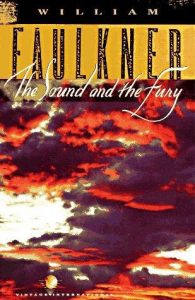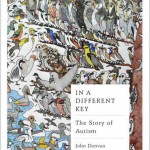 “The Sound and the Fury” is typically viewed as a difficult book, involving a stream-of-consciousness style and multiple perspectives to explore events the final throes of a plantation family in Mississippi just 30 – 60 years after the abolition of slavery in the United States. One of these perspectives is that of Benjy, a character usually described as an ‘idiot’ in the words of the twentieth century. He might now be termed ‘proundly intellectually disabled’. Some authors have identified traits they recognise as autistic. His correct diagnosis is not relevant to the depth that Faulkner brings to the character’s own mind and perspective in the first section of the book, written in the first person as the consciousness of an adult man who has no spoken words.
“The Sound and the Fury” is typically viewed as a difficult book, involving a stream-of-consciousness style and multiple perspectives to explore events the final throes of a plantation family in Mississippi just 30 – 60 years after the abolition of slavery in the United States. One of these perspectives is that of Benjy, a character usually described as an ‘idiot’ in the words of the twentieth century. He might now be termed ‘proundly intellectually disabled’. Some authors have identified traits they recognise as autistic. His correct diagnosis is not relevant to the depth that Faulkner brings to the character’s own mind and perspective in the first section of the book, written in the first person as the consciousness of an adult man who has no spoken words.
Continue reading Autistic expression in “The Sound and the Fury” by William Faulkner (1929)
All posts by Stuart Neilson
Anxiety
I have been suffering from anxiety recently and, unlike Asperger syndrome, anxiety does cause me a great deal of distress. I do call anxiety ‘suffering’. I don’t know the answers to anxiety (or even, much of the time, where my anxiety comes from), but I have a few techniques for reducing or distracting my mind from anxious thoughts.
“The Eagle Tree” by Ned Hayes
 I read and loved “The Eagle Tree” by Ned Hayes, an absorbing and intense story of a boy’s love for trees and his intense fascination with the world and natural processes that surround him – an environment that, unfortunately, everyone else seems oblivious to. Amongst this natural beauty is The Eagle Tree, possibly the last Ponderosa Pine west of the Cascade Mountains. The tree can’t be saved, but perhaps it can be climbed before it is too late.
I read and loved “The Eagle Tree” by Ned Hayes, an absorbing and intense story of a boy’s love for trees and his intense fascination with the world and natural processes that surround him – an environment that, unfortunately, everyone else seems oblivious to. Amongst this natural beauty is The Eagle Tree, possibly the last Ponderosa Pine west of the Cascade Mountains. The tree can’t be saved, but perhaps it can be climbed before it is too late.
Autism and curry sauce
I had never been aware of “curry sauce” until moving to Ireland, but recently tried recreating it from fresh ingredients at home, as requested by my teenager. Curry sauce is part of a tradition of taking the alluringly exotic aspects of foreign foods and repackaging them into a form that is safely not too Other. A full-blown aloo gobi and chapatis would be excessive, but curry sauce on chips is a comforting kind of daring. Similar recipes include Coronation Chicken, a blend of curry powder, cream, chicken and raisins that can be spread in a bread sandwich. Coronation Chicken was itself based on the even less threatening Jubilee Chicken, a blend of mayonnaise and hints of ingredients from all over the British Empire. (Bananas, papayas, raisins, coconuts, limes and all kinds of “foreign” are frequently thrown on or into completely inappropriate recipes, all “foreign” being much the same thing).
BBC Autism Season
The BBC has a fabulous collection of autism-themed programmes and series for autism acceptance month, which are available for a further 2 weeks (from the first episode date), so catch them while they are available. The young folk all know how to tune in to and record the BBC, so ask them.
The fear
I have not posted anything in a while, because of a lot of internal strife and withdrawal from the world. Anxiety is hard to write about, because it often has no words – and because alexithymic people especially have trouble in identifying and describing feelings. Actions are easy: throughout a four-week period in February I left my house on just four occasions, because my activity tracking wrist-band and phone calendar tell me so. All four were appointments to lecture or with the wonderful people at Aspect (http://corkautism.ie/aspect/) who support me.
Ten books on disempowerment and psychiatric states
These are ten books I have read recently that have a common theme (some looser than others) of disempowerment and psychiatric states. People who have diagnosed psychiatric illness, or are perceived ’differently’, are less likely to be believed or to be treated with respect. These books present the feeling of disempowerment from a first-person perspective, with varying degrees of success. They also present some of the negative consequences (for the person and community) of disbelieving and disrespecting the ‘Other’. Some of the characters receive inadequate medical care because their providers are too hurried or too disinterested to follow through the characters’ expressed needs. The police are not inclined to assist or believe ‘unreliable’ characters, at a cost to their own investigations.
Continue reading Ten books on disempowerment and psychiatric states
“In A Different Key” – A story of one perspective of autism
 “In a Different Key: The Story of Autism” by John Donvan and Caren Zucker is a lengthy and panoramic history of autism. I can recommend it for its sheer depth of research and quality of referencing, with the proviso that it presents a history of parents of autistic children. The degree to which autism is portrayed as a tragedy and the loss of a normal child will be unpalatable to many people who have autism themselves.
“In a Different Key: The Story of Autism” by John Donvan and Caren Zucker is a lengthy and panoramic history of autism. I can recommend it for its sheer depth of research and quality of referencing, with the proviso that it presents a history of parents of autistic children. The degree to which autism is portrayed as a tragedy and the loss of a normal child will be unpalatable to many people who have autism themselves.
Continue reading “In A Different Key” – A story of one perspective of autism
An Interpretation of Dreams and Nightmares
I recently had a conversation with a psychiatrist about a long-standing problem I have with waking, in a state of panic, frequently drenched in sweat and having vividly unpleasant thoughts in my head. Sometimes the thoughts and sensations of the dream can take ages to clear. The psychiatrist’s take on it was amazingly fresh: perhaps this is a consequence of neurology and not of psychic disturbance. The dream may be evoked by the senses (a sound or a smell), or represent some attempt at rationalizing a sensory experience. This has implications for how to respond to sleep disturbance and distressing dreams.
Autism in print news
News media both reflect the reality and shape perceptions about autism. This is an overview of the portrayal of autism in printed news in Ireland and the UK, with downloadable data files of the references and keyword counts for anyone who wants to examine the data. Any feedback on the existing results or further analysis would be most welcome. (Please note that the text of the articles is not included.)